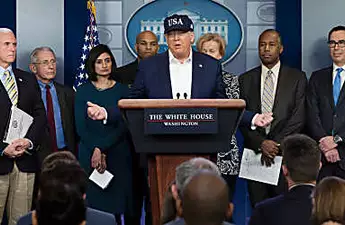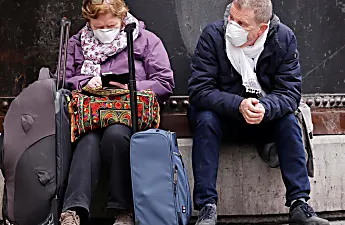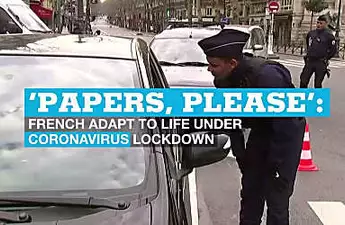Issued on: Modified:

ADVERTISING
Washington
Monica Ortega has been delivering groceries for three years, but with American life transformed by the coronavirus pandemic and many people staying indoors, her job has never felt more vital.
"Talking to people who are trying to get stuff for their family or people who have a disease and can't get out, it definitely feels like a necessity now, and I want to do what I can to help them," she told us at France24.
In order to do that, though, she has to brave long lines in picked-over grocery stores where the risk of catching the disease is real, all for a job that, while increasingly lucrative, provides her with unpredictable income and few benefits.
"It's definitely a weird feeling. Everyone is pretty much in panic mode at these stores," 36-year-old Ortega, who delivers for the Instacart service in Los Angeles's San Fernando Valley, told us at France24.
The COVID-19 outbreak has rendered once mundane activities like a trip to the supermarket perilous and pushed authorities to lock down swaths of the United States, including the entire state of California on Thursday.
Yet it's also provided a jolt to the retail industry, pushing more hiring and bonuses and putting delivery drivers and cashiers on the frontlines of the coronavirus outbreak.
- 'Modern day heroes' -
Walmart this week said it would hire 150,000 people to meet increased demand, cut its recruitment process from two weeks to 24 hours and pay out $365 million in bonuses.
Rodney McMullen, CEO of the country's largest supermarket chain Kroger, said the company has hired 2,000 people in the last week but still has 10,000 openings.
Faced with stay-at-home orders and health concerns, stores have cut their hours to accommodate for extra time spent cleaning, and designated special hours only for older people seen as more at risk of the disease.
When Italy's government locked the entire country down to stop the virus, demand for home deliveries spiked 68 percent, said Joan Driggs of research firm IRI, and the same increase is set to hit American drivers.
"They're kind of turning into our modern day heroes," Driggs said. "They definitely are on the frontline and it's up to the manufacturers, retailers to ensure their people feel safe on the job."
Instacart, one of several such services whose workers pick out, buy and deliver groceries, has joined many American employers in offering sick pay to its employees to encourage them not to work if they may be ill, though in a blog post it said none of them had contracted COVID-19.
Yet drivers fret over being exposed to the virus at grocery stores, where long lines and large crowds make maintaining the six-foot distance authorities recommend to keep the virus at bay difficult.
"It's more mentally exhausting because of everything that's going on," said Christina Barnhart, who delivers for Instacart in the San Fernando Valley.
- A perilous trip -
Customers are taking their own precautions by asking drivers to leave their groceries on the curb, Ortega said, who also worries about unwittingly spreading the virus.
"It's trying to tip the scales between that and risking my health," she said.
She now wears gloves, uses hand sanitizer regularly and has tied a buff around her face for protection, but that didn't stop one customer from coughing on her as she shopped.
Grocery executives have downplayed threats to their supply chains, saying they're ready to meet demand.
But the National Retail Federation has warned that authorities enforcing lockdown orders have closed distribution centers and businesses catering to truckers, threatening shipping, while analysts are concerned about the rising chaos in the wider economy and whether it could hit retailers.
"All the uncertainty that we have on the sales front, on the supply front, the financial markets are in a shock themselves, everything is kind of feeding on itself and it's hard to try and stop it," Oren Klachkin of Oxford Economics said.
Instacart doesn't provide health insurance, and while she fears the virus, Barnhart said the pay, which can amount to as much as $35 per hour, will keep her working.
"It is chaotic, but, you know, I'm making money," she said. "I just gotta stay healthy."

![Couple Are Confused Why Their Pic Is Going Viral but Then They Notice Why [Photos] Couple Are Confused Why Their Pic Is Going Viral but Then They Notice Why [Photos]](https://images.outbrainimg.com/transform/v3/eyJpdSI6ImYyMjZiMzlmMzQ1MGIzNzExMTk1OGU5MjA1ODQ3ZDE5MWQ3MDY0NTE5ZjVmMjdhNDRmMGFlMzdlNTJmNzkzYTgiLCJ3IjoyMzAsImgiOjE1MCwiZCI6MS41LCJjcyI6MCwiZiI6NH0.webp)
![How Russians Really Live [Pics] How Russians Really Live [Pics]](https://images.outbrainimg.com/transform/v3/eyJpdSI6IjkwMTYzYjAxMjc5MGZhYTdjMGY0M2ZkYzU2MjYzMTBjZmI1YjM0Y2ZkMjI3Y2UwMDJlNDUxN2ZiMDZmNDk0OGYiLCJ3IjoyMzAsImgiOjE1MCwiZCI6MS41LCJjcyI6MCwiZiI6NH0.webp)





![[Pics] Unique Home Remedies That Actually Work [Pics] Unique Home Remedies That Actually Work](https://images.outbrainimg.com/transform/v3/eyJpdSI6ImU0NWQ3NjM5NDdiNWJiM2ZhYTc2ZjBlZTA3OGViMzk0ZjVkOTA3OGMxOTU0YmI5ZGE3MGY1YmQzM2YxNDViYjMiLCJ3IjoyMzAsImgiOjE1MCwiZCI6MS41LCJjcyI6MCwiZiI6NH0.webp)




No comments:
Post a Comment